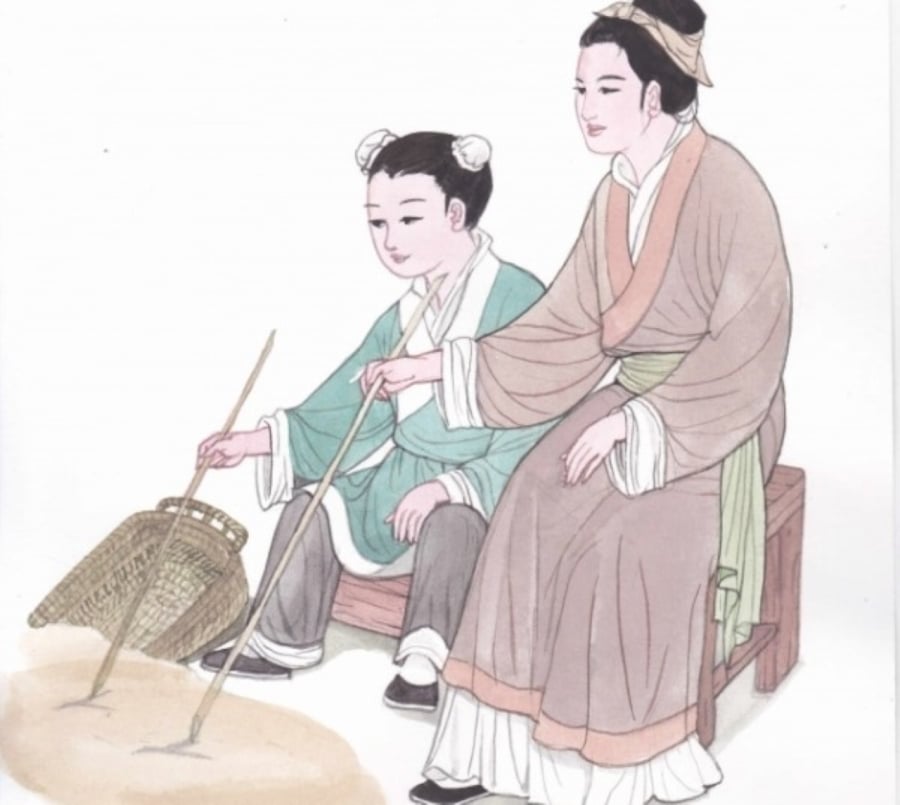Au Duong Tu is a famous historian and writer of the Northern Song Dynasty. When he was four years old, his father passed away. His mother, Trinh Thi, raised him and supported his education. Despite only having read a few ancient books, through her extraordinary determination, she was able to educate her son to become a talented and virtuous person, a shining example of a Confucian gentleman of ancient times.
During his lifetime, Au Duong Tu’s father was known as an upright and hospitable official. Their home was always crowded with people coming to visit, and the family had enough to eat. However, after Au Duong Tu’s father passed away, their living conditions gradually became impoverished. Eventually, the two mother and son fell into a state of “having no room and no land”.
But Au Duong Tu’s mother was a strong and determined woman. Despite being poor, she worked hard to support her son and help him grow up to be a decent person.
When Au Duong Tu was six years old, his mother started teaching him how to read and write. She also taught him about moral values. Because they were poor and couldn’t afford pens and paper, she used a stick instead. She even spread sand on the ground to use as paper and taught her son to write each stroke of the characters. This is the origin of the saying: “Using a stick to write characters, teaching children to become noble people”.

The origin of the saying: “Using a stick to write characters, teaching children to become noble people”.
As Au Duong Tu grew older, his mother took him to the neighbors’ houses to borrow books to read. Sometimes she even copied the content of those books.
One day, Au Duong Tu asked his mother, “Why do you have such determination and strength to raise me?”
His mother replied, “After your father passed away, I was able to raise you like this because I wanted you to know the high moral virtue of your father. I loved your father and I also love you, so I was determined to raise you to have the same moral virtue as your father. Even if things were worse, I could still endure it for your sake.”
Later, she talked about her own background and how her husband treated her, saying, “When I married into the Au Duong family, your paternal grandmother had passed away. But from your father’s memories of his mother, I knew that your father was a filial son. At home, he respected his elders, and when he worked as an official, he was always just and upright. He never did things loosely or casually…
During the day he worked, and at night he stayed up late to review court cases before going to sleep. For those who were sentenced to death, your father would review the verdict many times. He believed that human life was related to Heaven and couldn’t be taken lightly. Later on, he became sick due to exhaustion.
Before your father’s final moments, he said, ‘I may not live to see my son grow up, but I hope that in the future, you can tell our son that one should not be greedy for wealth and profit, and in life, one should not pursue things beyond their fate. One should respect their superiors and possess a kind heart. This is the legacy your father is leaving behind.”
After hearing his mother’s words, Au Duong Tu cried and said, “I will definitely follow my father’s instructions and become a person of high moral virtue.”
Thanks to his mother’s upbringing, Au Duong Tu obtained his doctorate at the age of 24. He held many important positions such as Academician of the Hanlin Academy, Deputy Ambassador of the Xu Secretariat, Chief Secretary… Under the reign of Emperor Tongzhi of the Song Dynasty, he was promoted to the position of Minister of War.
In the third year of the Khanh Ly Calendar, due to his efforts to help Pham Trong Yem preserve the new teachings and support reformist families, and to fight against corruption and factions, and follow the righteous path without fear of violence… he was demoted.
Au Duong Tu was worried that his demotion would bring sadness and worries to his mother. But when Au Duong Tu’s mother learned about it, she said, “You were demoted because of your dedication to justice. It cannot be said that it is not an honor. Our family is accustomed to poverty and deprivation. As long as your thoughts are not burdened and your spirit does not falter, I am already very happy.”
Her words made many officials of the contemporary court exclaim, “With a mother like that, how could her son not be great?”






























